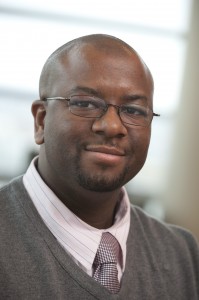Theodore Hickman-Maynard Joins STH as Visiting Assistant Professor of Evangelism and Church Renewal
 Theodore N. Hickman-Maynard joins Boston University School of Theology as Visiting Assistant Professor of Evangelism and Church Renewal. As a graduate of Boston University (MDiv ’03 and PhD in Practical Theology ’15), Dr. Hickman-Maynard is already deeply connected to Boston University School of Theology, not just as a student but also through his dissertation research on historically Black gospel choirs in the Boston area, including BU’s Inner Strength Gospel Choir.
Theodore N. Hickman-Maynard joins Boston University School of Theology as Visiting Assistant Professor of Evangelism and Church Renewal. As a graduate of Boston University (MDiv ’03 and PhD in Practical Theology ’15), Dr. Hickman-Maynard is already deeply connected to Boston University School of Theology, not just as a student but also through his dissertation research on historically Black gospel choirs in the Boston area, including BU’s Inner Strength Gospel Choir.
“Dr. Hickman-Maynard is a dynamic teacher who brings a wealth of ministry experience and academic research to the classroom,” said Boston University School of Theology Dean Mary Elizabeth Moore. “His teaching on justice and postmodern theology prepares students to face today’s ministry challenges, and we are thrilled that he will be facilitating new dialogues on church renewal, inside and outside the school.”
In addition to his education at Boston University, Dr. Hickman-Maynard earned his B.A. at Harvard University with a concentration in Afro-American studies. Dr. Hickman-Maynard’s expertise is in practical theological methodology, evangelism and mission, ecclesiology, black liberation and womanist theologies, Wesleyan theology, and urban youth ministry. His dissertation focused on historically Black gospel choirs set in predominantly white campuses, begun in the 1960s to create a safe cultural space for Black students. At Boston University, the Inner Strength Gospel Choir was born when Black students who felt disconnected began to gather in their dorm rooms and start singing.
Now, these choirs have transitioned from all-Black cultural spaces to multiracial cultural spaces, and from religious spaces to communities that may include people of many faiths or no faith. Dr. Hickman-Maynard examines how these groups can maintain their own sense of identity and unique cultural practice while also welcoming others.
“I look at it through the lens of evangelism,” he says. “If evangelism is about crossing the boundary lines of religious identity, crossing the boundary lines of your confessional community— where does that actually happen in ways that are communal? How do you take a whole practice and make it available to others?” These questions also reflect Dr. Hickman-Maynard’s interest in postmodern theology and what it means to be a worshiper of God in a postmodern context.
Dr. Hickman-Maynard is currently teaching a section of the core course “Practicing Faith,” focused on the practice of justice. The class examines how the pursuit of justice can be reflected in pastoral ministries—not just in externally-focused ministries but also in preaching, in liturgy, in Christian education, in youth ministry, in fellowship ministries and discipleship. As students tackle theology from the specific concern of justice, they learn to examine their core beliefs and reassess them.
Dr. Hickman-Maynard brings his own pastoral and ministry experience to his training of future ministers. He served as an instructor at the New England Annual Conference Ministerial Institute with the African Methodist Episcopal Church and currently serves as Co-Pastor of the Bethel African Methodist Episcopal Church in Bridgeport, CT. His role at STH includes developing a program in church renewal—using the resources of STH to generate a conversation in the theological academy and among church practitioners about what the church should look like in the future, across denominations, across cultures, and across regions.
His own experience and education inform his approach to theological education. Theological education prepares students with the wisdom they will need when life and ministry get difficult and they have to make decisions about who God is and their place in the world, says Dr. Hickman-Maynard: “Theological education makes you comfortable with making those decisions.”
“Even if we don’t change our positions, the goal is that we understand them more deeply,” Dr. Hickman-Maynard says. Theological education should aid students in understanding people who disagree, and build the knowledge that even people on opposite sides can still be concerned with human flourishing. “I think the benefit of the education is that you build an empathy for someone on the other side of an issue that allows you to stay in relationship with them in spite of the disagreement,” he says.
In his time so far as a teacher at STH, Dr. Hickman-Maynard said his favorite moment was when, at the end of a class, a student made a gesture as if her mind was exploding and then said, “Knowledge is so cool.”
“That was the best – watching someone’s mind open to a new idea,” he says. “They don’t yet know what to do with it, they don’t yet know if it’s useful or not. But there’s this lightbulb that goes on that says to them ‘This is big and it will change me.’ That moment of realization and to know that I had a part in that, that’s the best.”
